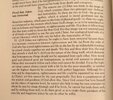TryingToLearn
Puritan Board Freshman

So the part of Turretin (Vol. 1, pg. 474) I have a question on is included above. My question basically pertains to whether Turretin is implicitly making the Covenant of Works natural, if that makes sense.
As the 1689 Confession states, "The distance between God and the creature is so great, that although reasonable creatures do owe obedience to Him as their creator, yet they could never have attained the reward of life but by some voluntary condescension on God's part, which He hath been pleased to express by way of covenant".
However, Turretin seems to argue here that if Adam acted righteously, God was obligated by nature to continue to grant life to him. Even if God killed Adam for a time, in the end, God would have to grant life to Adam because righteousness and life cannot be separated perpetually. To me, this strangely seems to imply some natural form of effectively condign merit, where it would be unjust for God not to continue to reward Adam with life should he continue to obey Him—and this not because of covenant, but by nature.
Compare Thomas Boston's words in "Human Nature and It's Fourfold State":
"There was no proportion between the work and the promised reward. Before that covenant, man was bound to perfect obedience, in virtue of his natural dependence on God; and death was naturally the wages of sin, which the justice of God could and would have required, though there had never been any covenant between God and man—but God was free; man could never have required eternal life as the reward of his work, if there had not been such a covenant. God was free to have disposed of his creatures as he saw fit—if he had stood in his integrity to the end of time, and there had been no covenant promising eternal life to him upon his obedience, God might have withdrawn his supporting hand at last and so have made him creep back into nothing, whence almighty power had drawn him forth. And, what wrong could have been in this, for God would have only taken back what he freely gave?"
Is Turretin in conflict with Boston and the 1689 on this point? Or am I failing to distinguish?
Last edited:
